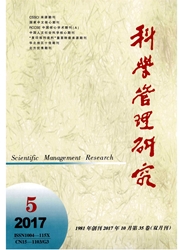
欢迎您!东篱公司
退出

 中文摘要:
中文摘要:
运用向量自回归模型及脉冲响应函数和方差分解法,对1979-2006年间中国的FDI、人力资本和R&D投入等技术进步变量对能源效率的影响进行了研究。增加科技投入、加速人力资本形成和促进FDI吸收和利用,对中国能源效率的提高具有长期效应。
 英文摘要:
英文摘要:
The paper researched the impact of technical progress variables such as FDI, human capital and R&D over China's Energy Efficiency from 1 979 to 2006 by utilizing the VAR model Impulse Response Function and Variance decomposition methods. Increasing the technology inputs, accelerating the formation of human capital and boosting the admitting and utilization to FDI will produce a long-time effect ion to improve China's Energy Efficiency.
 同期刊论文项目
同期刊论文项目
 同项目期刊论文
同项目期刊论文
 期刊信息
期刊信息
